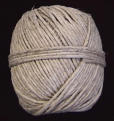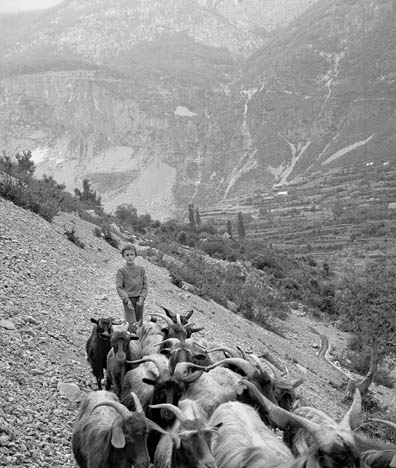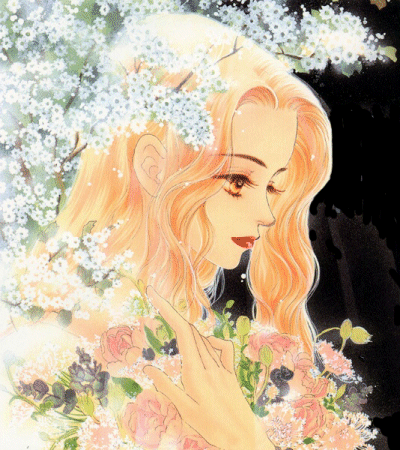The Ball of Twine
 |
 |
Once upon a time - as all fairy stories begin - on a faraway island there lived an old woman. She was ancient and stern. Her eyes were unusual: some might say they were a colourless gray, but if they looked at you, you would feel their power. Nobody could say from whence she came, or when she arrived on the island.
As the years passed people left the barren island for better prospects elsewhere.
Perhaps it was one such person who, out of desperation left her newborn baby at the opening of the cave where the old woman lived. The old woman's face softened into tenderness when she found the child. She picked the infant up and carried her into her dwelling place.
 The
only person who roved close to the cave was a lonely young goatherd, an orphan
whose parents had both perished in the cruel sea. The boy tended a few goats
and exchanged goat milk for food. Although solitary, he had grown sturdy and
strong from walking and climbing the rough hilly terrain of the island.
The
only person who roved close to the cave was a lonely young goatherd, an orphan
whose parents had both perished in the cruel sea. The boy tended a few goats
and exchanged goat milk for food. Although solitary, he had grown sturdy and
strong from walking and climbing the rough hilly terrain of the island.
Whenever he saw the old woman, he nodded a greeting, but did not linger to talk, for he well understood the sanctity of a person who wished to live alone in a cave. So it was a great surprise one day, when she beckoned to him and spoke in a dry, rusty sounding voice (a voice that hadn't been used for countless years), inquiring whether he had any milk to spare. She handed him a dented little pot, and after milking one of the goats, she handed him a handful of nuts by way of payment. Greatly daring, he asked whether she would require milk the following day. She nodded and turned away without a smile.
The next day when he came to the cave, he heard a baby's cry. Astonished by this, he asked if she had a child with her. She gave him a look which forbade any further familiarity, so he went on his way with his payment of a handful of nuts. However, the daily contact gradually burgeoned into a cautious friendship. They would exchange greetings, and she started to bring the child out to show him how the baby had thrived on his goat's milk. His visits to the cave became longer, and he took to carrying the little infant while talking or singing songs to her. The old woman began to thaw, her frozen features melting into an occasional smile.
Then one day, he refused the exchange of food for goat's milk. The old woman's face returned to its former aloofness. She said she had no need for charity. The boy assured her that it was not a matter of charity. He had grown so fond of the little one that he felt she was his responsibility as well, and so he too would like to contribute to the baby's wellbeing. The old woman gazed at him for a long while with her strange eyes which seemed to look into the distant future, and then abruptly agreed. She invited him to live in the cave and share their lives. The boy was eager and grateful.
As time went on, he built a fence of twigs and branches to keep the goats from straying, except when he took them down the hillside to pasture. The little herd increased in the spring and milk was abundant. The old woman made curd and cheese. She taught the boy where to find nut trees and how to recognize edible plants and showed him the wild fig trees and the lone apricot tree hidden in the folds of the hillside, the fruit of which they dried and stored for winter. The youth was happy to listen to the wisdom of the old woman as day by day she taught him many secrets of living close to Nature, and availing of Her bounty for their sustenance. When there was an over-abundance of male goats, they slaughtered some of them in order to preserve the meagre pastures for the she-goats and their young. The old woman demonstrated how to cure the goat hide, to dry the meat and sharpen the horns to use as knives or digging instruments.
The island grew more and more deserted, and the boy salvaged seeds left behind by former owners. He found a sheep and her little lamb, and the old woman combed the sheep's wool and collected enough rough fleece to fashion a small blanket. The boy acquired many new skills and he thanked the old woman for teaching him so patiently. She smiled and told him that one could never stop learning as long as their was a guide to point out the way. She also told him that gradually he would learn to teach himself, and then he would never stop learning until the day he died. He pondered on this remark, but could not fathom her meaning for he was still young and inexperienced in the ways of human nature.
Years went by peacefully for this strange trio dwelling
on the lonely island. The child grew and turned into a  picture
of loveliness with golden hair and deep blue eyes. She was patient and already
filled with quiet wisdom, surrounded as she was with the gentle love of these
two guardians, and her innocence shone like a gem in the grim surroundings of
their rock cave. The boy too grew to manhood, and his kindliness increased through
the years. Once he had asked the old woman if she had a name, and she answered
with a faraway expression that if she had one, she'd now forgotten what it was.
He never raised the question again as it seemed to evoke some painful memory
buried in her past.
picture
of loveliness with golden hair and deep blue eyes. She was patient and already
filled with quiet wisdom, surrounded as she was with the gentle love of these
two guardians, and her innocence shone like a gem in the grim surroundings of
their rock cave. The boy too grew to manhood, and his kindliness increased through
the years. Once he had asked the old woman if she had a name, and she answered
with a faraway expression that if she had one, she'd now forgotten what it was.
He never raised the question again as it seemed to evoke some painful memory
buried in her past.
But as the girl grew older and learned to speak he suggested that she should have a name. He told the old woman how lost he felt because he too had no name and how he had felt sad when people used to address him only as "boy". He'd been identified so closely with his small flock that he wouldn't have been surprised if someone had called out to him, "Hey, goat!" The old woman understood and asked whether 'Serena' was a name he would like for the child. The name released a fountain of happiness within him, and he ran down the hillside shouting "Serena, Serena" until he was exhausted.
So Serena it was, and their world continued to be filled with peace and love. One day Serena asked the old woman whether she was her mother. After all she had been told that kid goats each had their own mother, and so did the lamb. The time had come to reveal the past. The old woman told her the truth and the part played by the tall young man through the years. Serena looked gravely at them both and thanked them for their love and care. The old woman said that all children were born to be loved, no matter what the circumstances. She added that Serena should never question why she was abandoned as her mother must have been desperate, but even so she'd left her where another human being would find and care for her. Serena gazed into the old woman's compelling eyes and nodded slowly as she made the pledge. Then she looked at the solemn face of the young man beside her and as she smiled, sunshine flooded the cave.
One morning, when Serena was eighteen, the old woman did not rise as usual. The man was concerned, and approaching her resting place, he laid his hand on hers. She opened her strange eyes and gazed at him. As usual between these two, there was no need for words. He called out to Serena and she hurried to them, alarm flooding her lovely face.
The old woman took Serena's hand and then told the man to go to the back of the cave and open an old wooden box which rested there. It was the only thing she had not shared with him. She instructed him to bring the contents of the box to her. All he found was a ball of twine, yellow with age, but still strong. It was the size of his hand span. The old woman took it from him and gave it to Serena. The old face then turned to the man, and she made him promise to stay by Serena's side and never to desert her.
 She
then asked them to draw closer while she explained the purpose of the ball of
twine. From henceforward, she said, they must follow the dictates of the ball.
Each morning, they were to face the rising sun, then turn their backs to the
sun and face west, and gently roll the ball of twine out in front of them, while
holding one end in their hands. They should then follow the path of the unwinding
twine to wherever the ball stopped. This would take them the better part of
the day, or until sunset. At the spot where the ball rested, they were to halt
for the night and rewind the twine back into the ball. The next morning the
routine was to be repeated.
She
then asked them to draw closer while she explained the purpose of the ball of
twine. From henceforward, she said, they must follow the dictates of the ball.
Each morning, they were to face the rising sun, then turn their backs to the
sun and face west, and gently roll the ball of twine out in front of them, while
holding one end in their hands. They should then follow the path of the unwinding
twine to wherever the ball stopped. This would take them the better part of
the day, or until sunset. At the spot where the ball rested, they were to halt
for the night and rewind the twine back into the ball. The next morning the
routine was to be repeated.
The young man asked what would happen if there was an obstruction in the way of the ball. The old woman smiled mysteriously and said that in life there were always obstructions. He nodded in thoughtful silence.
Serena was distressed and cried out that she would not, could not, leave the old woman. He shushed her gently and advised her to listen carefully because time was now running short. The old woman smiled at him gratefully and went on to say that if the ball of twine rolled over a cliff, then it was up to them to retrieve it before sunset, or if the ball rolled into water then he must also retrieve it before the sun went down. The ball would never fully unwind until it had led them to their final destination.
She blessed them both for the years of happiness they had given her, and exhorted the young man to provide the necessities of life for Serena in the same way as he had done with the goat's milk when she was a baby. The old woman then asked them to keep looking into her eyes until she breathed no more because in this way she would give them both the only gift she had - the magic of living.
So she passed away and he closed her strange eyes and made a grave of their cave, sealing it with a rock, while Serena sat by with the ball of twine in her hands. Her sorrow was silent and dry of tears for it lay deep, very deep within her.
The young man made a bed of rushes by the side of the cave and covered Serena with the blankets of sheep-wool. He then rested his back against a boulder and kept vigil for the old woman who had meant so much to him, thinking all the while of her vision for Serena and his own promise to guard and guide the young woman with faithfulness and courage
And so, the next morning they would set out on their journey - following the enchanted ball of twine to that unknown place where destiny awaited them
